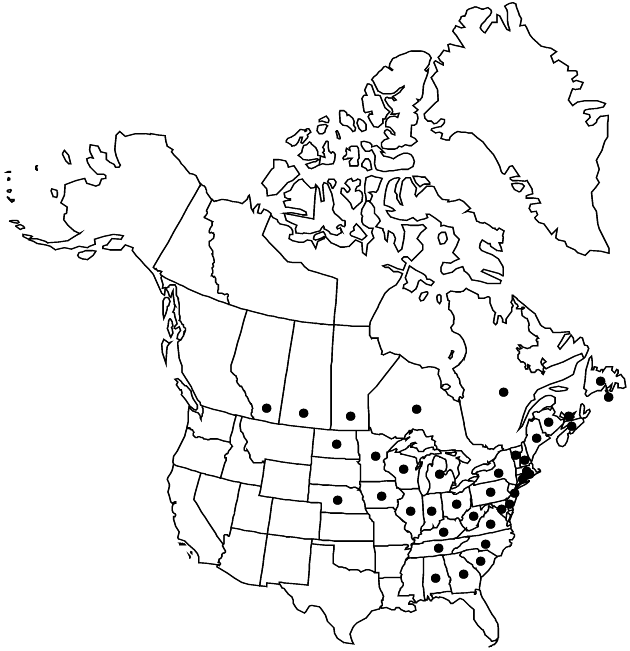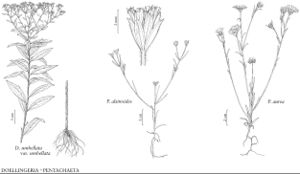Difference between revisions of "Doellingeria umbellata"
Gen. Sp. Aster., 178. 1832.
FNA>Volume Importer |
RevisionBot (talk | contribs) m (Bot: Adding category Revised Since Print) |
||
| (7 intermediate revisions by 3 users not shown) | |||
| Line 8: | Line 8: | ||
}} | }} | ||
|common_names=Tall flat-topped white aster;parasol whitetop;aster à ombelle | |common_names=Tall flat-topped white aster;parasol whitetop;aster à ombelle | ||
| − | |basionyms={{Treatment/ID/ | + | |special_status={{Treatment/ID/Special_status |
| + | |code=F | ||
| + | |label=Illustrated | ||
| + | }}{{Treatment/ID/Special_status | ||
| + | |code=E | ||
| + | |label=Endemic | ||
| + | }} | ||
| + | |basionyms={{Treatment/ID/Basionym | ||
|name=Aster umbellatus | |name=Aster umbellatus | ||
|authority=Miller | |authority=Miller | ||
| + | |rank=species | ||
| + | |publication_title=Gard. Dict. ed. | ||
| + | |publication_place=8, Aster no. 22. 1768 | ||
}} | }} | ||
|synonyms={{Treatment/ID/Synonym | |synonyms={{Treatment/ID/Synonym | ||
|name=Diplopappus umbellatus | |name=Diplopappus umbellatus | ||
|authority=(Miller) Hooker | |authority=(Miller) Hooker | ||
| + | |rank=species | ||
}} {{Treatment/ID/Synonym | }} {{Treatment/ID/Synonym | ||
|name=Diplostephium umbellatum | |name=Diplostephium umbellatum | ||
|authority=(Miller) Cassini | |authority=(Miller) Cassini | ||
| + | |rank=species | ||
}} | }} | ||
|hierarchy=Asteraceae;Asteraceae tribe Astereae;Doellingeria;Doellingeria umbellata | |hierarchy=Asteraceae;Asteraceae tribe Astereae;Doellingeria;Doellingeria umbellata | ||
| Line 29: | Line 41: | ||
-->{{Treatment/Body | -->{{Treatment/Body | ||
| − | |distribution= | + | |distribution=Alta.;Man.;N.B.;N.S.;Nfld. and Labr. (Nfld.);Ont.;P.E.I.;Que.;Sask.;Ala.;Conn.;Del.;Ga.;Ill.;Ind.;Iowa;Ky.;Maine;Mass.;Md.;Mich.;Minn.;N.C.;N.Dak.;N.H.;N.J.;N.Y.;Nebr.;Ohio;Pa.;R.I.;S.C.;Tenn.;Va.;Vt.;W.Va.;Wis. |
|discussion=<p>Varieties 2 (2 in the flora).</p> | |discussion=<p>Varieties 2 (2 in the flora).</p> | ||
|tables= | |tables= | ||
| Line 53: | Line 65: | ||
-->{{#Taxon: | -->{{#Taxon: | ||
name=Doellingeria umbellata | name=Doellingeria umbellata | ||
| − | |||
|authority=(Miller) Nees | |authority=(Miller) Nees | ||
|rank=species | |rank=species | ||
| Line 60: | Line 71: | ||
|basionyms=Aster umbellatus | |basionyms=Aster umbellatus | ||
|family=Asteraceae | |family=Asteraceae | ||
| − | |distribution= | + | |distribution=Alta.;Man.;N.B.;N.S.;Nfld. and Labr. (Nfld.);Ont.;P.E.I.;Que.;Sask.;Ala.;Conn.;Del.;Ga.;Ill.;Ind.;Iowa;Ky.;Maine;Mass.;Md.;Mich.;Minn.;N.C.;N.Dak.;N.H.;N.J.;N.Y.;Nebr.;Ohio;Pa.;R.I.;S.C.;Tenn.;Va.;Vt.;W.Va.;Wis. |
|reference=None | |reference=None | ||
|publication title=Gen. Sp. Aster., | |publication title=Gen. Sp. Aster., | ||
|publication year=1832 | |publication year=1832 | ||
| − | |special status= | + | |special status=Illustrated;Endemic |
| − | |source xml=https:// | + | |source xml=https://bitbucket.org/aafc-mbb/fna-data-curation/src/2e0870ddd59836b60bcf96646a41e87ea5a5943a/coarse_grained_fna_xml/V19-20-21/V20_57.xml |
|tribe=Asteraceae tribe Astereae | |tribe=Asteraceae tribe Astereae | ||
|genus=Doellingeria | |genus=Doellingeria | ||
| Line 71: | Line 82: | ||
}}<!-- | }}<!-- | ||
| − | -->[[Category:Treatment]][[Category:Doellingeria]] | + | --> |
| + | |||
| + | [[Category:Treatment]] | ||
| + | [[Category:Doellingeria]] | ||
| + | [[Category:Revised Since Print]] | ||
Latest revision as of 18:30, 6 November 2020
Plants 50–200 cm (short to long-rhizomatous, sometime colonial). Stems 1–10(–20), ascending to erect, striate, glabrous or sparsely hairy. Cauline leaves: mid and distal crowded, blades broadly to narrowly elliptic, (35–)60–110(–150) × (5–) 13–25(–35) mm, ± reduced distally, not stiff, bases attenuate, margins entire, involute, finely ciliate, apices acuminate, faces glabrous or sparsely hairy, especially along veins abaxially, or densely hairy. Heads (3–)20–100(–300+). Peduncles 1–10 mm, moderately to densely canescent; bracts linear-lanceolate to elliptic. Involucres 3–5 mm. Phyllaries in 3–4 series, triangular-lanceolate, midveins not swollen, apices finely subulate, strigose. Rays (2–)5–10(–16); laminae (4–)7–10(–12.3) × (0.8–) 1.2–1.8(–2.7) mm. Disc florets (5–)11–26(–50); corollas 3.5–6 mm, lobes 2–3.2 mm, 60–75% of limb. Cypselae 1.4–3.2 mm, 4–6-ribbed, sparsely to densely strigose; pappi: outer 0.2–0.8 mm, inner 3.5–6.2 mm. 2n = 18.
Distribution

Alta., Man., N.B., N.S., Nfld. and Labr. (Nfld.), Ont., P.E.I., Que., Sask., Ala., Conn., Del., Ga., Ill., Ind., Iowa, Ky., Maine, Mass., Md., Mich., Minn., N.C., N.Dak., N.H., N.J., N.Y., Nebr., Ohio, Pa., R.I., S.C., Tenn., Va., Vt., W.Va., Wis.
Discussion
Varieties 2 (2 in the flora).
Selected References
None.
Key
| 1 | Leaves: abaxial faces sparsely piloso-villous (fewer than 10 hairs/mm 2); Newfoundland to Minnesota, s to n Alabama and Georgia | Doellingeria umbellata var. umbellata |
| 1 | Leaves: abaxial faces densely puberulent (more than 12 hairs/mm 2); n Ontario, s Manitoba (disjunct to Alberta) s to Nebraska, Iowa, Illinois | Doellingeria umbellata var. pubens |
